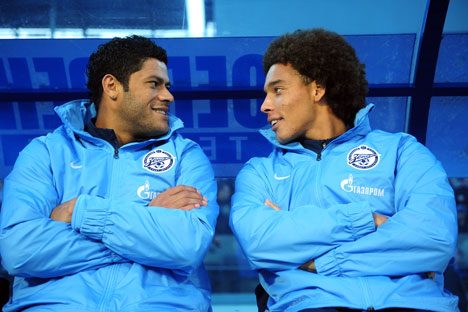
The players of St. Petesburg's Zenit: Hulk(L) and Axel Witsel. Source: ITAR-TASS
A limit on the maximum salary payable to players may be established in the country’s top soccer division, the Russian Premier League.
The State Duma intends to adopt an act to establish this cap before the end of its spring session. Parliamentarians believe that a salary cap would limit the fees paid to unqualified sportsmen and coaches, especially foreign ones.
According to Dmitry Svishchev, First Deputy Chairman of the Duma Committee for Physical Culture, Sport and Youth Affairs, the introduction of a salary cap is an extremely complex matter, but agreement in principle will be reached in the near future.
“I think we will finish with drafting this act in this year's session,” the Mir 24 TV channel quotes Svishchev as saying.
Svishchev also believes that it is not official salaries that should be tracked, since managers of clubs can purposely understate these, but instead the total amount of fees paid, including bonuses.
Gennady Solovyov, vice president of FC Dynamo Moscow, has previously voiced his support for the introduction of a salary cap.
“We are of the opinion that a salary ‘ceiling’ needs to be set up in Russian professional Football League clubs and in other leagues,” Dynamo’s official website quoted Solovyov as saying.
“In reply to the objections of our opponents, who say that there will be ‘grey’ schemes, shadow payments ‘in envelopes’, etc., we can only say one thing: Everybody will be held liable for this,” said Solovyov.
Roman Babayev, head coach of CSKA Moscow, also brought up the subject of a limit on wages in late April, but only for young Russian players.
“A salary cap for young Russian players under 21 years of age needs to be introduced and compensation for the transfer of a player from his academy to a club needs to be increased, to make academies more motivated and interested in training young players,” said Babayev at a press conference.
A revolutionary idea for the world of soccer
The salary cap is an unusual phenomenon in the world of soccer. It is mainly used in other sports, particularly in the American NFL, NBA and NHL.
In Russian sports, the limiting of salaries was first attempted by the governing body of the Kontinental Hockey League (KHL), but they have failed to set a hard ceiling.
At various times it has been possible to exceed the cap through the so-called ‘luxury tax’ (an additional contribution to the league’s budget) or through ‘excluded players’ – stars like Alexander Radulov and Ilya Kovalchuk, whose salaries were not taken into account in the overall list.
In the FNL (Russian National Football League), the second strongest soccer league in Russia, a maximum amount which can be earned by an individual player or coach will soon be introduced (300,000 rubles, equivalent to approximately $8,500), but there will be no combined salary cap for a team.
With regard to European national and international soccer tournaments, no severe restrictions have been set, but in 2009 UEFA approved the ‘financial fair play’ concept, which is intended to help clubs reduce their payrolls and prevent the sport being dominated by rich teams.
Development of the concept of financial fair play
Honorary president of the Russian Football Union Vyacheslav Koloskov told Gazeta.ru that he agrees with the initiative by State Duma members, but would propose to resolve this issue through sports federations and to involve not only soccer.
“This question, of course, is a rather acute one,” emphasized Koloskov. “However, it is unclear why it only applies to soccer. After all, salaries in ice hockey and basketball are much higher or at least comparable. If a decision on this is made on a legal level, we need to do it for all sports. What I would also include in this bill is the matter of payments to agents, because a lot of money is taken out of soccer to pay for their services.”
According to the ex-president of the RFU, the introduction of a salary cap would be a logical continuation of UEFA’s activities concerning financial fair play.
“It is clear that we have not seen such things in soccer leagues as yet, but after all, financial fair play is in the same spirit. Maybe it is not as specific as a salary cap, but it is in fact a prerequisite to a salary cap. It is no coincidence that Platini and his associates have elaborated on this issue,” said Koloskov.
First published in Russian in Gazeta.ru.
All rights reserved by Rossiyskaya Gazeta.
Subscribe
to our newsletter!
Get the week's best stories straight to your inbox